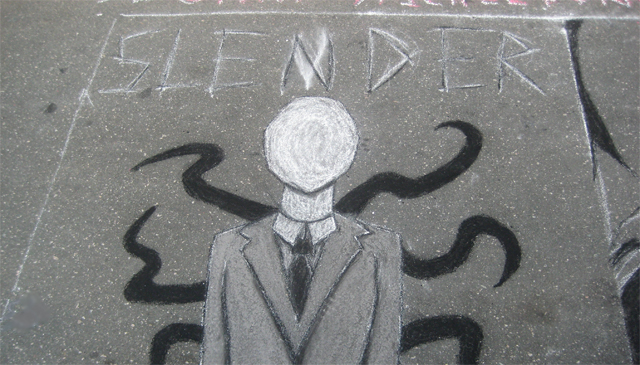
Modern mysteries abound online. There were the 77,000 videos of colored rectangles and tones which appeared on YouTube this year. BBC and others compared it to "numbers station" spy communications. Someone on NPR even suggested aliens (turns out it was just Google). Then there was the disappearance of Malaysian Airlines Flight 370; the world watched, rapt, as the mystery unfolded and numerous hypotheses were put forth. CNN suggested aliens.
Conspiracy theories and urban legends, though different forms of storytelling, operate in similar ways, and have a specific relationship to the belief or skepticism of their audience. These days, the meeting ground for the development of these stories is the internet, the new campground we all sit around. One contemporary urban legend, Slender Man, has lurked in the virtual realms since 2009, but finally made national headlines when life tragically imitated art. With multiple violent attacks earlier this month connected to Slender Man, the mysterious bogeyman of online horror fiction is now firmly in the zeitgeist (expect imitations of him to pop up in next season's horror films and crime drama TV shows).
Folklore often presents a facade of having always existed, or originating mysteriously in some ambiguous earlier time. Yet, digging beneath the surface, one finds that bogeymen such as Cropsey, recently documented lurker of Staten Island, and Bunny Man, the axe-wielding legend of my own hometown, have origins in actual events. Today, online haunts replace the real world, and myths are no longer localized but related to online subcultures. Folktales have jumped from the campfire to the screens of our computers and phones.
The paranoia over this new threat is reminiscent of the heavy metal, Dungeons & Dragons, slasher flick, Satanism scares of the 1980s, in which a handful of fatal incidents were sensationally reported. There were over-the-top headlines, court cases, TV exposés; books were sold, and movies were made. It's a long road to that level of national panic, and though Slender Man has just started, he has the internet to help him. Slender Man is a pastiche of folkloric monsters, and his stories are crowd-sourced fan fiction.
But the problem is not just disturbed kids confusing fantasy with reality; for those looking to share extremist views, the internet becomes a great equalizer of fact and fiction. One of the Las Vegas shooting perpetrators was apparently a fan of Slender Man; neighbors claim to have occasionally seen him dressed in a Slender Man costume. Both shooters were members of the so-called “Patriot” movement, and also attended a rally at notorious racist Cliven Bundy’s ranch. So here we have a tacit connection between two prominent contemporary folklore: fan fiction and conspiracy theories, both facilitated by online subcultures before then leaking out into the real world in the worst of ways.

